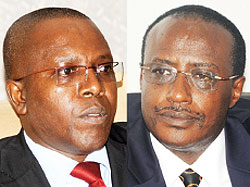As member states of the East African Community (EAC) move towards a single regional currency, their chief negotiators will visit European Union (EU) headquarters to learn best practices needed to establish a strong, stable single currency.


As member states of the East African Community (EAC) move towards a single regional currency, their chief negotiators will visit European Union (EU) headquarters to learn best practices needed to establish a strong, stable single currency.
The study tour, which commences on Monday, will help EAC members to better understand the prerequisites for a monetary union such as conversion rates, currency changeover and transitional arrangements to a single currency.
The tour comes at a time when talks on the Monetary Union are in high gear, with the High Level Task Force having so far negotiated 49 Articles; more than half the articles in the draft Monetary Union Protocol.
Dr Thomas Kigabo, a chief economist at the National Bank of Rwanda and the chief Rwandan negotiator, said it was important for the region to learn from others before adoption of the single currency.
"The European Union is the model to all monetary unions. We want to see where they got problems during their negotiations, where they had weaknesses and this will absolutely help us in our negotiations for the establishment of single currency,” he said in interview with The New Times.
Kigabo added that though European countries are currently besieged by the Euro crisis, it was still the best institution to provide advice on the establishment of a single currency.
The team is also interested in understanding how the Frankfurt-based European Central Bank (ECB) works alongside national banks. The EAC plans to set up a regional bank.
Although the single currency is being negotiated, its establishment is still seen as controversial, especially as EAC partner states have so far failed to implement already negotiated protocols.
Economist, Professor Manasseh Nshuti welcomed the monetary union but singled out the need to first harmonise several factors; including fiscal policies, taxation and macro-economic convergence, among others.
He further explained that for the whole process to be achieved efficiently there was a need to fortify the political commitment from partner states.
The Executive Director of Capital Markets Authority, Robert Mathu, urged EAC member states to study the issues well.
"They must properly understand the financial issues that have shaken Europe and all the challenges. This will help them shape and come up with ways of coming up with a strong single currency”, he advised.
The regional experts are expected to tour various institutions like the EU Commission, the European Central Bank, the German Federal Bank, the Federal Ministry of Finance and Federal Ministry of Economics and Technology. They will also visit the European Investment Bank, the European Development Fund and the EU Council of Ministers.


